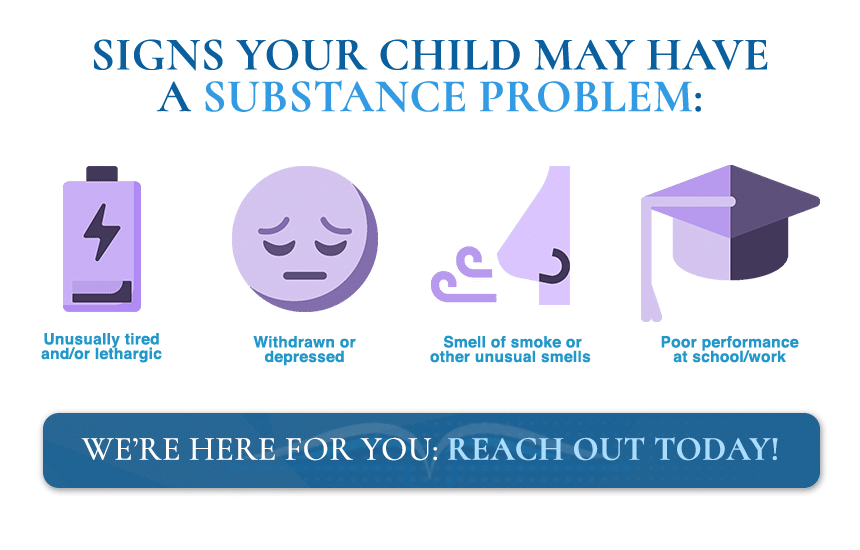Addiction is hard; there’s no doubt about it. What’s also difficult in its way is watching somebody you love struggle. This is especially true for a parent of an addict. Every parent (ideally) wants the best for their children and wants to love them unconditionally; the hard part is when the child doesn’t want to recover.
Thankfully, at Chapters Recovery Center in Davers, Massachusetts, there are resources available for parents struggling with this specific circumstance. Parents of addicted children can find the guidance and emotional support they need to help their families through this challenging situation.
Identifying the Signs of Substance Abuse in Your Adult Child
Substance use disorders (SUDs) can impact various areas of an individual’s life. A person struggling with addiction may exhibit many signs and symptoms of addiction. But, in some cases, these signs might be harder to identify than others. In other instances, the signs of substance use disorders are more noticeable. Understanding what the signs of substance use problems are can ensure that you get help for your addicted child sooner than later.
Some of the most common signs that someone is abusing substances include:
- Avoidance of proper hygiene
- Concentration or memory problems
- Mood swings and other emotional shifts
- Changes in sleeping patterns (sleeping more or less than usual)
- Secrecy, dishonesty, manipulative behaviors
- Declining performance at school or work
- Decline in mental and physical health
- Changes in eating habits
Also, parents of addicted individuals may find paraphernalia in the home, such as needles or syringes. Parents should also take note of any missing pill bottles as people struggling with prescription drug abuse may resort to stealing medications from their family members. A prescription drug rehab in Danvers may be tthe answer.
Causes of Addiction
Some people struggling with mental health disorders develop co-occurring substance use disorders. They may become dependent on their medications or other substances. In any case, a mental illness can certainly play a role in the development of a drug or alcohol use problem.
Low self-esteem and peer pressure can also be risk factors. Sometimes, people find their self-worth in the opinions of others. Peer pressure affects adults, just like it impacts teens. So, if your adult child has friends or coworkers who engage in drug use, this can lead to drug use in their own lives.
A family history of addiction can have a significant impact on children who are part of the family. Adult children of addicts may feel embarrassed, ashamed, or scared about their family situation and not know how to cope. They may also feel isolated from friends and peers, making them more vulnerable to bullying or other negative social pressures. Additionally, they may experience feelings of helplessness and hopelessness, especially if they know a parent or family member has struggled with addiction.
Is Addiction Genetic?
Genetics can influence the probability of addiction, but it does not guarantee it. The presence of certain genes may increase someone’s risk of developing an addiction, but other factors such as environment and individual choices are also important. Environmental factors such as poverty or exposure to drugs at a young age have been linked to addiction. Additionally, an individual’s choice to experiment with drugs or alcohol can increase their risk for SUD.
Ultimately, it is difficult to answer this question definitively. Addiction is a complex disorder that involves many different factors and can affect people differently. While there is no one-size-fits-all answer, it is important to recognize the various factors that can contribute to addiction.
How Addiction Impacts the Parents of Addicts

When an adult child is addicted to a substance, it can heavily impact their relationships with their parents. Substance abuse can create distance between one family member and another. The parent of an addicted child may find it difficult to trust their struggling child or believe that they can change. The addiction itself becomes the focus rather than the connection between parent and child, causing feelings of guilt and resentment.
Ultimately, addiction affects the entire family. It can damage trust, hurt communication, and lead to financial hardship. To foster a healthy relationship between parents and children, families must create boundaries. It is also important to ensure everyone receives support during this difficult time. Treatment programs can help provide support for both the addict and their family members so they can work through their issues together.
What Parents of Addicts Can Do
When you find out your child is an addict, it can be a difficult and overwhelming experience. It is important to remember that your child needs help, and he or she may not be able to do it alone. Here are some things you can do to help yourself and your adult son or daughter.
- Get support from loved ones. Reach out for support from family and friends. You are not alone in this struggle!
- Hold an intervention. Your son or daughter may not realize the impact drug and alcohol use are having on the family. You can hold an intervention to show your child why he or she needs treatment.
- Eliminate enabling behaviors. Enabling can come in many forms. Giving your child money, having poor boundaries, providing a place for them to live, “covering for them” in front of family members or friends, and many other behaviors can do more harm than good for your child.
- Don’t blame yourself. Feeling guilty is a natural emotion for parents of addicts. Some people feel responsible, especially if they are former addicts themselves. But, such feelings can prevent people from helping their children.
- Attend support groups. Groups can provide great support to the family members of addicted individuals. Find a support group in your area and attend meetings as often as you can.
- Show compassion and understanding. Stay calm and avoid judgment. Substance abuse is a complex mental health issue, and your child needs understanding and support to get through it.
- Learn more about your child’s addiction. Educate yourself about drug and alcohol abuse so you can understand how it affects your child’s behavior, motivation, and emotions. Educational information can help you determine how to best help your child.
- Seek out treatment options from healthcare professionals who specialize in treating alcohol and drug abuse. Find addiction treatment resources and services in your area that can address your child’s addiction. A good rehab program can help your child face their problem head-on.
- Be present. Be there for your child and show them that you care. Offer unconditional love and support as they walk the long road to recovery.
- Practice self-care. This is the most important thing parents of addicted children can do. Be sure to practice self-care methods, respect your feelings, and take care of your own needs, no matter what. It is vital to living a healthy life.
The recovery process is ongoing; your child will need help and guidance throughout their journey. Be patient, stay positive, and continue to reach out for assistance when it is required. With persistence and dedication, your child can overcome addiction and lead a healthy life.

Breaking the Cycle
Breaking the familial cycle of addiction can be a difficult task, but it is possible. Many families have been able to overcome their addictions and lead healthier lives by recognizing the genetic predisposition for substance use disorder and preventing its transmission to future generations.
One way to break the familial cycle of is through education; teaching family members about the risks of substance use and the signs of addiction. This can help them recognize when they or someone else in their family is struggling and needs help. Providing support systems such as therapists, peer mentoring, or support groups is also beneficial; having someone to talk to who understands their struggle can make a world of difference for struggling individuals.
Finding Help Outside the Home
Finding help for an addicted child can be a challenging process. The best way for parents of addicted individuals to start is to be patient and open-minded when it comes to looking for resources. There are a variety of different options for parents seeking help for their children.
One option is finding professional counseling services that specialize in issues related to drug or alcohol abuse. This could be a therapist, psychiatrist, or other mental health professional. Not only is it a possibility to seek out counseling, but parents can also stage an intervention. However, they’ll require the help of a trained professional; interventions aren’t something to just casually put together. It is important to note that there are often sliding scale fees available for those who cannot afford full treatment services.
Another option is to find support by seeking out support groups and community organizations that provide resources and guidance for families battling addiction. These can be found online or in person, depending on the needs of the family and the type of drug involved. It may also be helpful to attend a treatment program, such as a residential or outpatient rehabilitation facility. These programs can provide support and guidance for working through this battle.
Treatment Programs for Drug and Alcohol Abuse

There are many treatment options available for alcohol and drug addiction treatment. Whether somebody is dealing with severe drug abuse or a milder form of a substance use disorder, there is individualized care for them. Some of these options include the following:
- Outpatient treatment
- Individual therapy
- Group therapy
- Family therapy
- 12-step programs
- Outpatient programs
Your child can live a sober life. Our support services can help those struggling with addiction and bring healing to their family members, including their parents.
Chapters Recovery offers comprehensive treatment for anyone struggling with a substance use disorder. If your child is suffering from alcohol or drug addiction and you’d like to learn more, you can contact us today. Your child’s freedom is only a phone call away. Let Chapters Recovery help your loved one live a healthy life.


